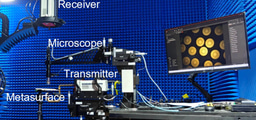Post-Covid: a new disease requiring innovative research
Published in Biomedical Research

Explore the Research

Treatment of 95 post-Covid patients with SSRIs - Scientific Reports
Scientific Reports - Treatment of 95 post-Covid patients with SSRIs
The second epidemic
In 2020 it started to become clear how many people got post-Covid (Long Covid) after a Covid-19 infection. Young lives, mothers, fathers, caregivers, teachers and many others are completely suffocated in their lives. Lying limp on the bed or couch with their hearts beating rapidly as if they were running a marathon. After a small activity they are exhausted and the complaints become worse. They cannot concentrate, have headaches and are overstimulated. Some lie with earplugs in and blinders on.
You stand on the shoulders of your predecessors
It is for longer known that in many neurological and psychiatric disorders - with similar neurocognitive complaints as post-Covid - the kynurenine pathway (KP), an important immunological pathway, is disturbed. It is also known that the KP uses the same essential amino acid as the serotonin pathway: tryptophan. Furtheron is also known that with ME/CFS, in terms of chronic fatigue, there is an overlap with post-Covid. In ME/CFS the HPA axis is (slightly) disturbed and many cytokines are found in their brains.
Based on this old knowledge, I suspected that something is wrong with the KP, the HPA axis and the serotonin metabolism in post-Covid. I had an idea for a drug (eureka!): an SSRI (an antidepressant). Because an SSRI both modulates the HPA axis and boosts serotonin levels. So I wrote a letter in the NRC (Dutch quality newspaper) in December 12, 2020, that I might have an idea for a post-Covid medicine. Since then, patients have been coming to me for advice more and more.
How do you do research without a university?
Together with a former head nurse, we guided many hundreds of post-Covid patients in the use of an SSRI. The results were so good that I wanted an RCT to be done. But as a retired neuropsychiatrist you no longer have a university behind you. I approached various universities, but received no response. Then I decided with a small team of five people, in which my husband (retired social science researcher) and our son (neuroscientist) also participated, to do our own research in our own time with our own money. This could at best be an exploratory cohort study. We decided to ask the first hundred post-Covid patients (unselected) to participate in the study from November 1, 2022 till March 2, 2023.
More bumps
But how do you present our study at the Medical Ethics Committee? Who is Carla Rus and can we trust her? After two months we still get the green light. We worked day and night to write a good article. Not only about the research method, but also in the description of the possible seven mechanisms why an SSRI can help post-Covid. However, the lack of an affiliation bothers us again when submitting the article to the journal. For convenience, they placed my husband, the former nurse and myself at our son's university where he works as a postdoc. After fierce protests, we are renamed 'independent researchers'. After the peer review process, our article was accepted. We jumped for joy: recognition for our hard work and happy with the fact that more post-Covid patients could now potentially benefit from this medicine. But we had to take that same hurdle again, because in the proofs we were conveniently placed back at our son's university. We offered the editors the idea of their colleagues of 'independent researcher', and to our great releave and pleasure they adopt it!
What do the biomedical sciences say about our mechanism?
The HPA is truly disrupted in post-Covid (Nature, September 25, Klein et al.). The KP is indeed disturbed (EBioMedicine, 2023, Guo et al). Serotonin levels have indeed halved on average (Cell, October 26, 2023). So never underestimate your intuition if you have as a doctor 40 years of experience!
Read our research and article specially created at the kitchen table of a family:
https://www.nature.com/articles/s41598-023-45072-9
Follow the Topic
-
Scientific Reports

An open access journal publishing original research from across all areas of the natural sciences, psychology, medicine and engineering.
Related Collections
With Collections, you can get published faster and increase your visibility.
Reproductive Health
Publishing Model: Hybrid
Deadline: Mar 30, 2026
Women’s Health
Publishing Model: Open Access
Deadline: Feb 28, 2026





Please sign in or register for FREE
If you are a registered user on Research Communities by Springer Nature, please sign in